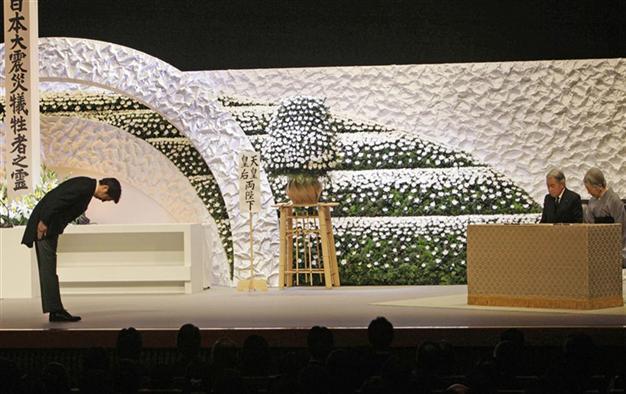Japan marks second tsunami anniversary
ISHINOMAKI, Japan - Agence France-Presse

Japanese Prime Minister Shinzo Abe, left, bows to Emperor Akihito, second right, and Empress Michiko during the national memorial service for the victims of the March 11, 2011, earthquake and tsunami in Tokyo, Monday, March 11, 2013. Japan marked the second anniversary on Monday of the disaster that left nearly 19,000 people dead or missing and more than 300,000 people still displaced. AP Photo/Junji Kurokawa, Pool
People all over Japan bowed their heads in silence Monday as they remembered the almost 19,000 who died when a ferocious tsunami surged ashore two years earlier.Ceremonies were held in towns and cities throughout the disaster zone, as well as in Tokyo, where Emperor Akihito and Empress Michiko led tributes to those who lost their lives in a disaster that also sparked a nuclear emergency.
As a mournful quiet descended, cold winds blew through the grounds of Okawa Elementary School, in Ishinomaki, where at least 70 children were swept to their deaths by the rising waters on March 11, 2011.
The city's tsunami alarms were sounded at 2:46pm (0546 GMT), marking the exact moment a 9.0-magnitude undersea quake hit, sending a massive tsunami barreling into Japan's northeast coast.
A total of 15,881 people are confirmed to have died and 2,668 others remain unaccounted for.
The Emperor paid tribute to those who lost their lives, including the more than 2,300 whose deaths have been recorded as being caused by the stresses of life in evacuation centres or temporary housing.
"I am always deeply moved by seeing how so many people lead their daily lives without complaining... and hope.... to be able to share their suffering, if only a little," he said.
Schoolgirl Rin Yamane recounted the horror of the day she lost her mother as they tried to escape the waves.
"Suddenly, we were in the middle of a black sea... When I saw her in a morgue a few days later, I knew then it was a reality," she said.
Police in Miyagi prefecture were Monday continuing their search for those still listed as missing, with a 50-strong team scouring the coastline.
"We haven't found any bodies for a year," police officer Toshiaki Okajima told AFP.
"But there are still 1,300 missing people in Miyagi alone and the feelings of families haven't changed. That's why the police need to keep looking for remains." Efforts to rebuild the disaster-hit region have been slow. Figures show 315,196 people are still without a permanent home, many in cramped temporary housing units.
Tsunami-hit communities are divided among those who want to rebuild on land that may have been in the family for generations and those who want to move their towns to higher, safer ground.
Prime Minister Shinzo Abe told a news conference he wanted the anniversary of the disaster to serve as a beacon.
"March 11 has to be a day for hope," he said. "When March 11 comes next year, it will have to be a day when people in the disaster zone can feel their communities are on the mend and their lives have improved greatly." The tsunami that swallowed coastal communities battered the Fukushima Daiichi nuclear plant, which went through meltdowns and explosions in what was to become the worst nuclear accident since Chernobyl in 1986.
Anti-nuclear campaigners Greenpeace say the government has failed to provide enough support to people who fled the leaking radiation, saying some are "in financial ruin and divorces and mental breakdowns are mounting".
"They need proper compensation and support to rebuild their lives," it said in a statement, urging Japan to phase out the nuclear industry. Nearly 10,000 aftershocks have been recorded since the original quake, including 736 jolts that measured above magnitude 5.0, some shaking the ground at the plant where there are still no permanent fixes for the damaged reactors.
The government says the plant is stable and no longer releasing dangerous materials. It says food products from the region are checked for radioactive contamination before being shipped to markets.
Despite reassurances, many consumers avoid Fukushima produce fearing it is contaminated, dealing another blow to the region's farming industry.
Dismantling the crippled reactors will take up to four decades, and the nation remains undecided over whether to continue using nuclear energy to power the world's third-largest economy.
Only two of its 50 commercial nuclear reactors have been restarted, with strict safety standards and political nervousness keeping the others offline.
But with no commercially viable alternatives available and staunchly pro-nuclear Abe at the helm, analysts say it is likely just a matter of time before some units are fired up again.

















